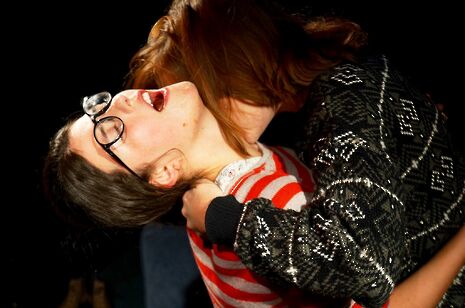Preview: 5 Lesbians Eating A Quiche
I caught up with the director and cast to gauge how to deal with the looming threat of communism in a lesbian utopia

What made you want to put this play on?
Rhiannon: We were searching through the wilderness that is Samuel French for something fun and bizarre to put on. It just so happens that we stumbled across this play and got everything we’d dreamed of and more – it’s got everything you could want. Lesbians! Egg-based food! An atomic bomb!
Do you think there’s enough representation of women in comedy?
Elinor: No. And this is a crying shame because we are really fucking funny. While the old ‘woman aren’t funny’ cliché may no longer be widely articulated, it is still very much a latent part of our society. I get sad of seeing the one token woman on Mock the Week not doing great then people remarking on how much less funny than the guys they are.
Rhiannon: I went to a smoker a couple of weeks ago and there was one female act – and it’s not that there aren’t a lot of funny women in Cambridge, it’s that, for whatever reason, they don’t often get their chance to shine.
Elinor: We don’t seem to realise that a woman struggling to engage with an entirely subjective standard in what is often a manufactured context is not enough evidence to say that 50% of the world are incapable of making you pee your pants laughing. Show me a woman who has never at some point refrained from sharing an outstanding piece of banter with someone she fancied because she didn’t want to seem too ‘boisterous’ or ‘laddish’. We are still shaking off the idea that a woman couldn’t possibly be funny and intelligent as well as sexy. (Proved wrong by our outrageously talented cast). I’m not saying this show will radically change that, but you've gotta start somewhere.
What about the representation of lesbians in theatre?
Rhiannon: I think the point of the play is that these women are independent, quiche-obsessed, a little bit bonkers and also lesbians. We’ve grown to love the characters so much – they’re a welcome breather from the media’s portrayal of lesbians as promiscuous sex objects.
Elinor: The play is set in the 1950s, so it’s a little removed from our time as well as our reality, but it makes a lot of points about sexism and homophobia. People don’t expect comedy to be capable of discussing such concepts but I find that done well it can make you question things in a way that is a lot more subtle and intricate.
What do you hope the audience will gain from seeing the show?
Rhiannon: Top lolz.
Evie: A whole new insight into the possibilities of quiche.
Emma KP: Facebook ammo on me for the rest of my life.
Elinor: Marjorie.
To the cast: have your roles challenged you in any way?
Evie: I think my role as Lulie has taught me never to fear the crazy in yourself – it has been a great opportunity to explore the possibilities of a *cough* slightly absurdist character. Connecting with Lulie has involved a lot of back story to understand how she’s ended up the strange human being that she is, and it has been tough to let go and embrace the crazy. But hopefully the audience will appreciate it, and I sincerely hope they enjoy Lulie as a character and a source of comedy, but also I hope they develop a strange sort of affection for her, as I have certainly done. I don’t quite know how I’ll leave Lulie (or quiche) behind.
Amy: In one of the first rehearsals, Rhiannon and Elinor decided that Vern was to be the “sexually frustrated” one of the group. A characterisation that I, naive as I was, wasn’t quite expecting. For someone who gets anxious at the thought of a little flirt on the dancefloor of Fez, embodying the sexual energy of Vern was always going to prove a little bit of a challenge. I’ll leave it to you to decide if I’ve succeeded.
Emma KP: I’ve never really been cast in a role like Ginny. She’s essentially the outsider of the group, who is never quite involved but is always desperate to be. She’s one of those people who is very eager to please but just ends up fucking everyone off. I have a history of being cast as very domineering, slightly crazy characters, so it was really interesting to do something so different and definitely out of my comfort zone. It’s been really fun to construct the development of Ginny throughout the play from someone who was very uncertain of her own identity to someone who is surer of herself and of her sexuality. Plus she’s a cracking brunt of jokes.
What’s up with the quiche?
Rhiannon: I think it might be a euphemism.
Elinor: I think you might be right.
5 Lesbians Eating A Quiche will be showing at 9:30pm, Tue 24th November 2015 – Sat 28th November 2015, at the Corpus Playroom
 News / Cambridge academics stand out in King’s 2026 Honours List2 January 2026
News / Cambridge academics stand out in King’s 2026 Honours List2 January 2026 Interviews / You don’t need to peak at Cambridge, says Robin Harding31 December 2025
Interviews / You don’t need to peak at Cambridge, says Robin Harding31 December 2025 News / AstraZeneca sues for £32 million over faulty construction at Cambridge Campus31 December 2025
News / AstraZeneca sues for £32 million over faulty construction at Cambridge Campus31 December 2025 News / News in Brief: Maypole mentions, makeovers, and moving exhibits4 January 2026
News / News in Brief: Maypole mentions, makeovers, and moving exhibits4 January 2026 Features / “It’s a momentary expression of rage”: reforming democracy from Cambridge4 January 2026
Features / “It’s a momentary expression of rage”: reforming democracy from Cambridge4 January 2026









